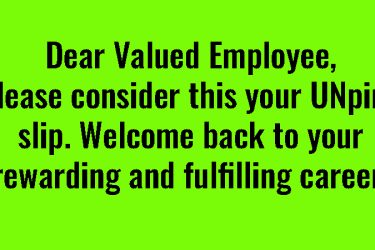By Richard Hadden and Bill Catlette
Onboarding new talent- when done well – is probably the smartest thing you can do to preserve your investment in recruiting (which was the topic of our post on November 26, 2021). In fact, we see onboarding as such a central part of the whole recruiting process, that for years we’ve called it “Re-Recruiting”.
There’s never been a time when this Re-Recruiting process has been more valuable than now, when The Great Resignation has placed a premium on finding AND keeping the people you need to make your organization run. And while excessive turnover is hard enough on operations, early turnover – people leaving in the first flush of their tenure with you – can suck the life out of your staffing efforts. And it’s largely preventable.
Here’s how. Six things.
- Welcome them before they start.
- Welcome – NO – CELEBRATE them on their first day!
- Get mutually well-acquainted.
- Make absolutely sure they have everything they need to succeed and be productive from day one.
- Educate, educate, educate – about their job AND your culture.
- Do regular, frequent check-ins.
Starting a new job is a BIG DEAL. For the employee. Make it a big deal for you as well.
As with Part One of this series, what follows is more a list than a narrative. Do these things and your new hire will be convinced that coming to work for you was the best career decision of their life.
- Have the CEO send the new hire a personalized letter, before their first day, for every position. I say this in every speech and training workshop I deliver, and I’m amazed at how rarely this is done. It’s so easy. And so powerful. Do it!
- For Pete’s sake, get all the paperwork (electronic and otherwise) taken care before day one, so they can dig right in and have some early successes. Nothing like a feeling of accomplishment on your first day to make you want to come back for a steady diet.
- Send them other fun stuff to get them excited about the culture they’re coming into. Get creative!
- Have someone make a welcome phone call a day or two before their first day – someone in their department, perhaps someone they did not meet during the interview process.
- Create a team of Onboarding Ambassadors, who will buddy up individually with new hires, to help them with all “new employee” kinds of things for the first few days or weeks.
- Have someone (an Onboarding Ambassador, if you have them) meet them on their first day, at the front door, to welcome them and take them to their workplace or manager. If it’s a Work From Anywhere job, do the same thing remotely.
- Provide a special parking space for the first week or two. And don’t forget to tell them about it!
- Hold a Welcome Party (individually is best), with co-workers, and people from other departments. Put a big poster on the wall, and have everyone sign it with a marker.
- Ask them (as in, this is optional) to complete a “Getting to Know You” form, with fun facts about them. Managers can use this information in designing rewards and recognition for the employee well into their tenure.
- Develop a Mentoring Program, specifically for new employees.
- For relocating employees: Create a Welcome Wagon Committee. Prepare a collection of items of local interest for them. Help them learn about the area, and get them oriented to their new community. Also help their spouse/partner and family to get engaged in the community.
- Check in with the new employee, asking specific questions, at the end of:
- Day One – ask these questions:
- Was today what you expected?
- Did anything surprise you?
- What questions do you have?
- Is there someone who was particularly helpful to you? I’d like to thank them.
- What can I do to help you before your second day?
- Week One – Ask your boss to spend a few minutes with the new person in order to 1) reinforce their decision to come to work for your organization, and 2) offer support.
- Week Two – Spend some time with them in their work area to find out 1) what they have learned, 2) what help they need.
- Month One – Ask your HR rep to take the new person to breakfast or lunch and discuss if they are finding the new job and work environment as they had expected it to be. If you don’t have an HR professional, turn to someone else you trust.
- Week Six – sit down with the person and ask them “How would you describe the culture here?” If they struggle to answer, give them your perspective. If what they say doesn’t match what you’d hoped, thank them, then do your own observing to see why they might have described your culture in that way. Then work toward any improvements that could help.
- Month Two – Review with the new person the performance expectations for their position, and ask for their candid self-assessment regarding their performance. Coach as necessary.
- Month Three – Spend an hour working with the new person, or reviewing their work output. Coach as needed.
- Day One – ask these questions:
- And then… at least every three months thereafter, conduct helpful coaching sessions, addressing topics defined either by you or by them.
Please don’t tell me you haven’t got time to do these things. When a new recruit leaves after a few days, weeks or months, for want of a more auspicious beginning, you’ll somehow find the time to replace them.
If you missed Part I of this series, the one on Recruiting, be sure to check it out. And also Part III – on Retention.
If we can help you with this, or any other part of your creating a great workplace, please contact us



